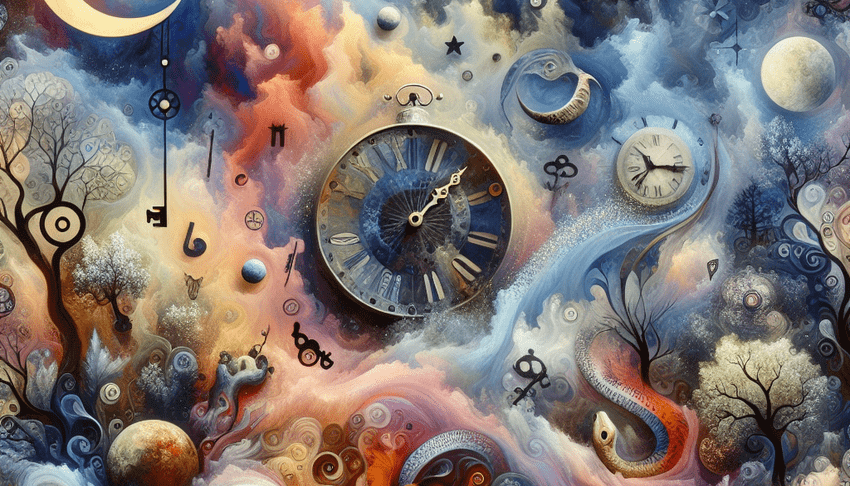Table of Contents
The Psychology of Relationship Dreams

Navigating Romantic Encounters
When we slumber into the realm of dreams, our unconscious mind often takes the wheel, steering us through a rich tapestry of narratives that can both mystify and enlighten. Notably, romantic dreams often hold a mirror to our deepest Relationship symbolism, unpacking layered emotions and highlighting the facets of our romantic desires and fears. Dream interpretation of relationships isn’t merely a speculative endeavor; it’s an introspective journey that could very well reflect our waking life encounters and internal emotional landscapes.
Romantic encounters in dreams can be vivid and memorable, lingering in our minds long after we’ve awakened. To understand these dream sequences, we must consider not just the overt content but also the emotional undertones and the contexts that fuel them. Dreams of romance can flourish regardless of one’s relationship status, yet it’s the emotional context that often shapes their significance.
Decoding the Dreamscape: Romantic Encounters
If you’re single, a romantic encounter in a dream might signify a longing for connection or an exploration of qualities you desire in a partner. Conversely, for those in relationships, such dreams can sometimes stem from contentment and love, or they can emerge as expressions of unaddressed issues or desires within the relationship. Interestingly, romantic dreams may not always be about the other person at all; they often shine a light on your own self-esteem, confidence, or personal growth.
- Intimacy with a stranger in dreams: This could suggest a readiness to embrace new experiences or the unexplored aspects of your psyche.
- Rekindling with an ex-partner in the dream world: It might reflect unresolved feelings or lessons yet to be learned from past relationships.
Taking a scientific lens to these phenomena, psychological research suggests that our dreams can be influenced by our daily activities, emotions, and interpersonal dynamics. Attachment theory, for instance, may offer explanations into why certain figures appear in our romantic dreams, pointing to our deep-seated emotional needs and fears.
Consider the story of Jamie, who consistently dreamt of romantic escapades with a mysterious figure. After delving into dream interpretation, Jamie realized these dreams symbolized a yearning for adventure and the uncharted, a stark contrast to her structured and predictable daily routine.
Dream Interpretation: A Tool for Emotional Insight
In analyzing one’s romantic dreams, it’s crucial to adopt an approach grounded in both emotional intelligence and open-mindedness. Dreams offer a unique pathway to self-discovery; by reflecting on them, we unearth layers of our emotions that might be obscured in our waking hours.
The dream interpretation of relationships is not a one-size-fits-all. Each dream narrative is as unique as the dreamer themselves. By weaving together the threads of Relationship symbolism and individual context, the tapestry of dreams can reveal romantic desires, hidden emotions, or even serve as a catalyst for personal growth and understanding.
In retrospect, romantic dreams are more than just idle night-time tales; they are potent symbols wrapped in the enigma of our unconscious. They beckon us to listen closely, for through understanding our dreams, we can gain clarity on the emotional nuances that color our waking relationships and personal journeys.
Familial Bonds and Frictions
Dreams can serve as our subconscious mind’s canvas, painting vivid pictures that represent the intricacies of our real-life relationships. Notably, familial bonds and frictions, being central to our emotional landscape, often find their way into our dreams. The interpretation of such dreams invites us to delve deep into our innermost thoughts and feelings, revealing insights into our family dynamics.
Unraveling the Symbolism of Family in Dreams
When we dream of family members, the symbolism can speak volumes about our hidden emotions, conflict, admiration, or even aspirations we hold towards them. Relationship symbolism in dreams often mirrors our day-to-day interactions and emotional attachments or detachments with our kin. For instance, dreaming of a nurturing mother figure might reflect our yearning for comfort and security, whereas a conflict with a sibling in a dream could point to underlying rivalries or unresolved tension.
- Interpreting Parental Figures: Dreams featuring parents might indicate authority figures in our lives or our own self-discipline. An authoritative father in a dream may symbolize structure or control, urging us to consider areas of our life where these themes are prominent.
- Understanding Sibling Representation: Dreams about brothers or sisters can highlight feelings of competition, companionship, or protection. Such dreams may lead us to reassess our current relationships and work towards resolving childhood competitions or strengthening bonds.
- Children in Dreams: Dreams of one’s own children, or children in general, can represent innocence, future potential, or aspects of oneself that need nurturing or attention. They may also reveal concerns about responsibility and caregiving.
Decoding the Messages in Familial Dreams
Every dream is a personal narrative that can illuminate the intricate web of our innermost affections and frictions within the family domain. Analyzing dreams from an evidence-based perspective allows one to unravel these messages carefully. Academic research has often linked dream content to our waking concerns and experiences, suggesting that these nocturnal visions can be reflective and potentially predictive.
For example, a dream where a family member is lost or in danger could signify anxiety about losing the emotional or physical connection with that person. Romantic dreams involving a partner or spouse may reflect the health and dynamics of the dreamer’s relationship or unexpressed desires.
Embracing the practice of dream interpretation involves carefully considering the context and emotions present in the dream. It requires a blend of personal insight and the understanding of universal symbols. Dream interpretation of relationships within the family can be particularly telling, as these are some of the most emotionally charged connections in our lives.
By grounding our dream interpretations in empirical evidence while also paying tribute to the uniqueness of personal symbolism, we can unravel the deeper meanings behind our familial dreams. Whether they are a mirror of our current reality or a labyrinth guiding us toward unresolved emotions—the insights we gain can help us navigate our familial relationships with greater awareness and empathy.
Symbolic Interpretations of Interpersonal Dynamics

Authority Figures and Power Dynamics
Dreams featuring authority figures – be it parents, bosses, or iconic leaders – often evoke a multitude of emotions and meanings. When we sleep, our subconscious mind doesn’t rest; instead, it communicates through a rich tapestry of symbols and scenarios, especially concerning power dynamics in relationships. Unpacking the dream interpretation of relationships with these figures can unearth insights into our need for approval, fears of judgment, and our own assertiveness and self-esteem.
The Symbolism of Authority in Dreams
Authority figures in dreams often symbolize the governing aspects of our own personality. They can represent our internalized standards or the principles we live by. The dream interpretation of relationships with such figures may differ based on the emotions felt during the dream – fear, admiration, resistance, or affection – reflecting our relationship with control and authority in our waking life.
- Relationship Symbolism: Seeing a benevolent boss or a supportive parent in a dream may indicate a feeling of safety or acceptance in a relationship.
- Romantic Dreams: Dreaming of a romantic liaison with an authority figure can highlight our desires for power, control, or validation in our love lives.
- Confrontations with Authority: Such dreams may represent a clash with our personal values or a challenge we are facing in a relationship dynamic.
Decoding the Power Dynamics
Understanding the dream interpretation of relationships with authority figures can tell us much about our sense of empowerment. An overbearing boss in your dream could be a subconscious reflection of feeling micromanaged in real life. Conversely, standing up to an authority figure in a dream might showcase a developing confidence or a need to assert oneself in a personal or professional relationship.
- Navigating Approval and Judgement: Dreams where we seek an authority figure’s approval could hint at our dependency on others for validation.
- Assertiveness: If we dream of dismissing an authority figure’s opinion or command, this could symbolize emerging self-assuredness and the pursuit of autonomy.
- Admiration and Aspiration: Meeting or being an authority figure in dreams can also reflect our ambitions and desires to emulate traits we admire in others.
Practical Dream Examples
Real-life examples often drive the point home effectively. Take, for instance, Maria, who frequently dreamt of her meticulous boss scrutinizing her work. Delving into the relationship symbolism, it was clear that she felt undervalued in her job. Or consider James, who dreamt of shaking hands with his deceased father – a dream signaling his desire for posthumous approval and guidance. These narratives emphasize the profound link between our waking interactions with authority and our inner dream worlds.
Dreams rich in relationship symbolism and power dynamics with authority figures provide a unique opportunity for personal growth. By engaging with the romantic dreams and confrontations experienced in the subconscious playground, we can unlock deeper emotional intelligence, improve our assertiveness, and refine our relationships. As we traverse the intricate world of dream interpretation, we gain the tools for a more empowered and authentic self.
The Strangers Among Us
Dream interpretation and the symbolism of strangers in dreams can illuminate so much about our inner world and our subconscious thoughts. When we analyze dreams that involve individuals we don’t recognize from our waking life, we can gain insight into how we perceive the unknown, transformative personal developments, and our openness to forming new relationships.
The Phantom Faces: Projections of the Psyche
When strangers populate our dreams, they often serve as stand-ins for different aspects of ourselves or symbolize emotions and traits that we may not fully acknowledge or understand. These characters can personify unknown potentials and qualities we have yet to integrate into our conscious identity. The relationship symbolism inherent in these encounters can be quite profound, as they mirror the way we connect with parts of ourselves that are alien or unfamiliar to us.
For instance, dreaming of a kind stranger assisting us might indicate an unacknowledged sense of hope or a newfound ability within us. Conversely, a threatening stranger could symbolize internal fears or unresolved conflicts. The dream interpretation of relationships in these contexts not only speaks to our interpersonal dynamics but also to our intrapersonal connections.
- Recognize the Emotions: Evaluating our emotional response to these dream strangers is vital. It may reflect our current emotional state or our feelings toward emerging aspects of our personality.
- Appraise the Context: The situations that we find these strangers in—whether they are helping us, hindering us, or simply observing—can provide clues to our subconscious mind’s view of change and the unfamiliar.
- Analyze the Interactions: How we interact with these strangers in our dreams can reveal our predisposition towards new experiences and relationships. Are we open and welcoming, or guarded and suspicious?
The Significance of Unknown Characters
Romantic dreams, in particular, often feature strangers as significant symbols. Even if we have no apparent connection or attraction to them in the real world, they can represent the qualities we desire or fear in a partner or relationship. They can also signify the beginning of new romantic feelings or anxieties that we may not yet consciously recognize.
The strangers in our dreams remind us that our subconscious is a vast and rich tapestry woven from our experiences, feelings, and thoughts. These ephemeral characters in our nocturnal narratives carry messages from the deeper recesses of our minds.
Through careful reflection and by embracing dream interpretation and symbolism, we can uncover what our psyche is attempting to communicate. Dreams with strangers are not just byproducts of random neural firing; instead, they are a meaningful part of our ongoing journey toward self-awareness and personal growth. They challenge us to confront the unknown within and around us, opening doors to unexplored territories of our being.
Summary
When we slumber into the world of dreams, the narratives we encounter are not just meandering tales, They are complex experiences woven into the very fabric of our emotional and psychological being. Relationship dreams are a particularly intriguing aspect of our dream life, offering vital insights into our desires, fears, and the way we perceive our personal connections. Dreams about romantic relationships, whether filled with intimacy or conflict, delve deeply into our subconscious and reflect the richness of our inner world.
Relationship dreams frequently provide a stage for our innermost feelings toward companionship and love. Whether you’re caught in a romantic reverie with a mysterious stranger or grappling with feelings towards an ex, these dreams can signify much about our longing for emotional connection and reveal much about our waking life encounters. For example:
- Single individuals might dream of romance as a manifestation of their desire for closeness or the traits they seek in a partner.
- Those in partnerships could experience dreams that reflect contentment or, alternatively, fears and unspoken aspirations within their romance.
Relationship Dreams: A Mirror to Our Emotional Selves
Our emotional reactions within these dreams provide invaluable context. A feeling of joy may indicate fulfillment, while anxiety could point to unresolved tensions. Current research aligns with the principle of attachment theory, suggesting these dreams can reflect our emotional needs and attachments. They allow for an introspective journey that can often explain or mirror our emotional landscapes in waking life.
Relationship dreams allow us to confront the dynamics we navigate daily. From trust issues to fidelity, the symbols we encounter – whether a friend’s betrayal or standing by a loved one’s side – articulate our internal struggles and align with significant value systems. They often serve as outlets for our subconscious to experiment with circumstances reflecting our emotional wellness.
The Symbolism in Connections: Understanding Dream Figures
Dream figures, such as friends, lovers, ex-partners, and even authority figures, serve as embodiments of various emotions and experiences:
- Dreams where friends betray us can point to trust issues or recent doubts about loyalty.
- Dreams of intimacy with an authority figure may represent our desires for power or validation.
- Dreams featuring strangers can symbolize unknown aspects of ourselves or unfamiliar traits we are contemplating.
It’s through these interactions that we gain insight into our ambitions, insecurities, and the state of our personal growth. Dreams invite us to engage with the deeper facets of our psyche and can act as a catalyst for self-discovery and emotional insight.
By interpreting relationship dreams, we uncover layers of significance within the seemingly cryptic symbols our minds present. A deeper understanding of these dreams enriches our waking lives, informing our emotional responses, and possibly guiding our decision-making in relationships.
In conclusion, while the realm of dreams might be draped in mystery, the interpretation of relationship dreams is more than a speculative exercise. It’s a way to engage with our subconscious and the emotional narratives that shape our lives. These dreams are not random threads but meaningful patterns in the intricate weave of our psychological makeup. By paying attention to the symbolism in our dreams, we can gain clarity and direction in our waking relationships and personal journey.
FAQ – Interpreting Relationship Dreams
What does dreaming about falling in love with a stranger symbolize?
Dreaming about falling in love with a stranger often symbolizes the dreamer’s desire for new experiences or excitement in their emotional life. It can reflect a longing to explore unknown aspects of themselves or their relationships, suggesting personal growth and the potential for new connections. These dreams may also hint at untapped potential within the dreamer, encouraging them to embrace the unfamiliar and discover new passions or areas of interest.
What does dreaming about being pursued by an aggressive lover suggest?
Dreaming about being pursued by an aggressive lover often symbolizes feelings of vulnerability or anxiety in your waking life, perhaps related to a current or past relationship that is or was intense and overwhelming. It could also reflect an internal conflict about desires and fears, where the aggressive lover represents a part of yourself that you are struggling to come to terms with or manage effectively. Such a dream invites you to examine your personal boundaries and the dynamics of your interactions in romantic contexts, perhaps steering you towards better understanding your emotional needs and how to articulate them.
What might dreams about romantic relationships signify in terms of emotional desires and needs?
Dreams about romantic relationships often reflect our innate human longing for connection, intimacy, and understanding. They can signify a desire for a deeper emotional bond or highlight areas in our waking life where we feel there may be a lack or an abundance of affection. Furthermore, such dreams may represent the qualities we yearn for in a partner or the aspects of our own personality we wish to develop in the context of a relationship.




